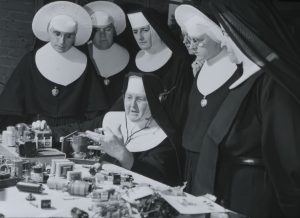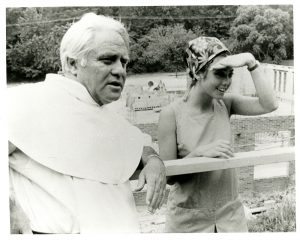
Catholic religious orders hold a unique place in the European settlement of what is now the United States, indeed some of the earliest Catholic colonial settlers came as members of religious orders. The Jesuits, for example, founded in 1534 by the Spanish Ignatius of Loyola, was the first order to send missionaries to propagate the faith among Native Americans. Franciscans followed soon after. The record of the interactions between these two orders and the Native American populations forms an important record of the early encounter between the two groups.
Women religious, for their part, also settled in the territory that became the United States, with French Ursulines arriving in modern-day Louisiana in 1727 and Elizabeth Seton founding the Sisters of Charity (later the Daughters of Charity) in Maryland in 1809. These two orders played a unique role in the establishment of Catholic women’s presence in the U.S., and helped lay the foundations of the American Catholic education system.
Fortunately, we have well-cared for records and wonderful histories of much of the Jesuit, Franciscan, Ursuline, and Sisters/Daughters of Charity experience. But this is not the case for all religious orders and their records. Religious orders in the U.S. held different missions, locations, and administrators. Many held houses in multiple provinces and countries. As they have expanded and contracted over time, their archival records have experienced a range of fates.

The Catholic Archives in the Digital Age: The Fate of Religious Order Archives Conference is the third in a series of conferences under the theme of how Catholic archives are evolving in the digital age. The specific focus arose as after the American Catholic History Research Center and University Archives worked with the Mission Helpers of the Sacred Heart in Baltimore to preserve their valuable archives as they moved from one location to another, will address aspects of the question of religious order archives in the United States. We figure Catholic University is a great place for such a conference–surrounded by religious houses from its origins, the University has historically served as a center of education for members of religious orders from around the country.
The free conference will be held on the CUA campus in the Pryzbyla Center on March 29th, 2017 and will feature a range of scholars and archivists of the American Catholic experience and archival stewards of religious order records. For the full schedule and to register, visit the website: http://iprcua.com/2017/03/29/the-fate-of-religious-order-archives/. The conference is generously funded by the Our Sunday Visitor Institute, and sponsored by the American Catholic History Research Center/University Libraries, the Institute for Policy Research and Catholic Studies, and the Department of Library and Information Science.
